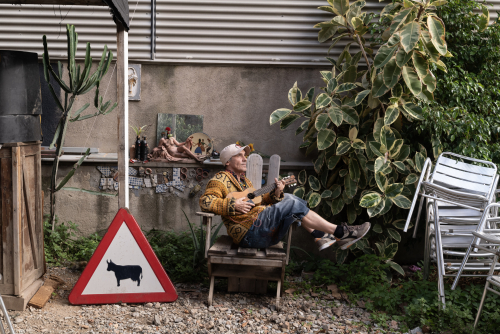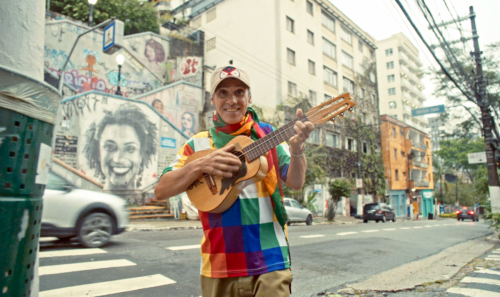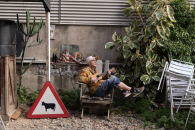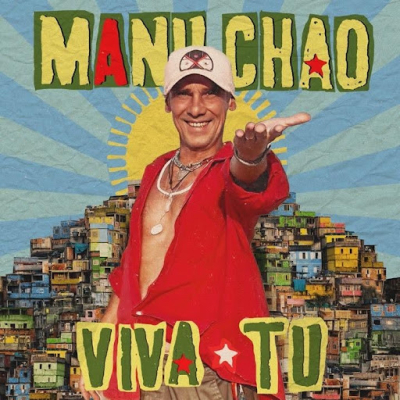Manu Chao
Click  on photo to download high resolution version
on photo to download high resolution version
All rights reserved. Photos are for editorial use only.
Photos
Latest ReleaseView All
Viva Tu
Release date: 9.20.24
Label: Because Music
Press Releases View All
Manu Chao’s Viva Tu Out Now (Because Music)
Read MoreManu Chao Releases His New Single "Tu Te Vas" Feat. Laeti From His Upcoming Album "Viva Tu" Available On September 20, 2024
Read MoreManu Chao Announces Forthcoming Album ‘Viva Tu’ Set For Release On September 20, 2024 And Shares New Single “São Paulo Motoboy”
Read MoreBiography View
And Viva Tu arrived, bringing Manu back to the forefront of new music releases —though he never really left— with a crystalline, honest, and emotional album, as moving as it is thrilling, melancholic and sweet, yet far from any naive innocence, for it knows whom it points to and what it celebrates: Viva Tu is a celebration of the other, of us, in community, in neighborhood. It is a work in which Manu Chao revives his unique way of looking within to find the outside and looking outside to find himself within, making musical virtue out of his elaborate simplicity, delving into his unique way of crafting a recognizable and familiar sonic and lyrical universe from the first chord. Viva Tu is pure Manu, it is chanson and rumba, it is cumbia and dub, it is the Mediterranean and the Caribbean, it is life and liveliness, it is a little alley without asphalt, a glass of clear water in times of muddy-fake, a shot of mead, intoxicating to the palate, revitalizing to the soul, energetic to the heart.
The album opens with "Vecinos en el mar," with Manu contemplating the decline of the world like a raft adrift, with the voice of uncertain fate and an outstretched hand, a tune so beautiful it leaves a scar. It continues with "La couleur du temps," a tender chanson for harsh reality, reflections on an upside-down world where all that's left is to dream standing up and clench fists to forget. In "River why," Manu warns of the collective suicide that neoliberalism signifies, with metaphorical verses questioning where life is on that bridge crossing over a dry river. "Viva Tu" was the first single, which gives the album its title, a celebration of community, a pleasant stroll through the neighborhood, the one with laundry hanging on window lines and the neighbor's radio escaping through the courtyard. In "Heaven's bad day," Manu shares the mic with the legendary outlaw country icon Willie Nelson, and together they ride in a duet over that ominous sky no one should visit. With the Parisian rapper Laeti, "Tú te vas" is created, a polyhedral and smoky collage lamenting absence and cursing luck. The anguish of distance, the emotional vertigo, steers the helm of "Coração no mar," promises tossed among the waves that stir the seas from Brazil to Galicia, because the sea cures everything.
Like the previous two, another staple of Manu's repertoire in recent times is "Cuatro calles," a sad nostalgia for what will no longer be, a song he's been performing in different versions on the streets and which is finally recorded. "La colilla" bravely walks through the rumba of life, frowning with disdain at those gentlemen who handle money and lives, and those ignorant leaders who despise what they don't understand. From the window of the roughest part of Brazil, we see "São Paulo motoboy," a song that smells of kerosene, hustle and cachaça, a punch against the asphalt. "Tom et Lola" is another one of those heart-tugging songs that Manu pulls from the heart of French chanson, a full-color love story sheltered by a neighborhood cinema. The sleeplessness of "Lonely night" draws anxiety with soft sound system beats in the heat of a blinding night. Viva Tu ends with the anthem titled "Tantas tierras," an honest summation of situations leading to perplexity in the face of an ambiguous and disconcerting reality: “Todo el mundo sin saber la que algún dia va a caer” ("Everyone without knowing what will someday fall"), but without losing hope: “No estamos solos” ("we are not alone.")
It has been more than three quinquennia waiting for this Viva Tu, yet Manu, like a nomad of suburbs and neighborhoods, has never stopped creating and playing. In the last six years, in an acoustic format, accompanied by his virtuous friends and comrades: Argentine guitarist and ukulele player Lucky Salvadori, whom he met during the musical festivities in the Caribbean Colombia, Galician percussionist Miguel Rumbao, an all-rounder in audiovisuals and passionate fisherman in Mexican and Galician waters, and/or Montevideo's Mauro "Metralla" Mancebo. And so Manu was seen during this time when he did not grant interviews, sharing the stage occasionally with other companions, whether they brought a tuba or violin, trombone or trumpet, rap or clapping, in crazy nights of hold-this-rumba-music, through theaters, plazas, and taverns, circus tents and urban gardens, parks, and other barricades of street life.
Manu's music has continued to flow and sound in a thousand different ways and for a thousand different reasons: whether it was the Matalunes Sessions in Barcelona, revisiting Siberie m’etait contéee, or the Baganga Sessions in Bombay, on the banks of the Ganges; or supporting a protest in Serbian Topli Dol against the power plant that would deprive the town of water; or participating in a streaming for Sos Rainforest Live, as a musical action to protect indigenous communities and the rainforest; or sending a support video for the struggle in the Patagonian province of Chubut against megamining; or the countless chords and melodies launched from anywhere in the world in favor of environmental or social justice, local or global…
His journey has been a geographical collage composed of small tours; it has been a constant presence with his guitar to voice the cry of those who put their finger on the wound of our Pacha Mama. The Chapulín Solo, in trio, has passed through various halls, family festivals, and popular fiestas in France, Switzerland, the Netherlands, Chile, Argentina, Brazil, Italy, Spain, Croatia, Hungary, Serbia, Bulgaria, Greece, Turkey, Singapore, Nepal, India, Macedonia, Slovenia, Norway, Colombia, Paraguay, Bosnia... Concerts perceived with an intimate, almost mystical aura, but with no other pretense than to be in tune and captivate a vibrant and complicit audience with simple and epic tunes. Using the excuse of these concerts, he has visited communities, associations, and cooperatives, activist groups defending social causes that need support: Manu listens and shares. And, of course, the reunion with friends, which always fuels inspiration.
Viva Tu is his fifth studio album, with a 17-year gap since the previous one. However, Manu has not been absent from all kinds of audio and/or video recordings, both formal and informal. Since 2018, he has been posting his Free New Songs on his website, tracks that he gives away, either signed under his name, or together with Chalart58 (with whom he recently released the compilation vinyl Inna Reggae Style), or with Kleia Renesi in the Ti.Po.Ta project. Also noteworthy are his contributions to Playing For Change, a project that, bringing together musicians from different cultures, is dedicated to building music schools around the world, where Manu contributed "Seeds of Freedom," as a protest against intensive and pesticide agriculture. He also recorded with Bunny Wailer, Mermans Mosengo, and David Hidalgo of Los Lobos. The Pluma Sessions series with Mr. Pluma, the nod with Mr. Lassh and Amogh to the Indian project The Dharavi Dream Project, which works to provide free access to a hip-hop school for underprivileged children; the Smily Killer Sessions of Coronarictus and Coronacactus, which cheered us up almost daily during the pandemic lockdown with his own songs and covers, solo or accompanied remotely by other musicians; the various deliveries of the Amazonian videos, almost documentaries, of Los Sueños de Tikuna, with images taken from Gustavo de la Hoz's film; and the varied collaborations with colleagues: Bomba Estéreo, Rumbakana, Carlangas, Dani Lança, Calypso Rose, etc., etc.
But let's rewind while listening to Viva Tu. Finding the origins of Manu Chao is to travel to his native Paris in the mid-eighties when that son of Spanish immigrants —Galician and Basque— was toughening up as a street musician, learning and participating in visceral bands like Hot Pants and Los Carayos, with the most varied rock (from rockabilly to cabaret through everything in between) and an urgent combat-clash attitude as calling cards. In 1987, he and his brother Antoine would start the adventure with Mano Negra, a seminal band that transcended borders and marked a before and after in the way of understanding punk rock, pachanga, and rumba worldwide. The mix of influences, their alternative ideology, and their way of operating made Mano Negra much more than an incendiary rock band. With four studio albums (the first three were cult records that spread like wildfire from hand to hand: Patchanka, Puta's Fever, and King of Bongo), and quixotic milestones like touring by boat with a circus company through the lost America, after an intense existence, the group disbanded in 1995, leaving an irreproachable legacy with a repertoire of irreverent and unforgettable songs: "Mala Vida," "Señor Matanza," "Guayaquil City," "King Kong Five," "Sidi h' Bibi"... Their last great adventure was aboard a train, playing in remote Colombian villages —an exploit captured by his father, the beloved, renowned, and respected writer and journalist Ramón Chao, in the book Un tren de hielo y fuego— and their last work, Casa Babylon, became a global milestone in how to undertake musical fusion through cultural crossover.
Then Manu Chao wandered with his acoustic guitar through the century, crying golden tears. An initiatory and inspiring journey through taverns and hammocks, without a roadmap to consult. Manu traveled the road that crosses Mexico, France, Brazil, Senegal, Spain, Argentina, and Mali, equipped with his portable studio, constantly recording, capturing moments that would end up becoming the songs of his first solo album, Clandestino, released in 1998. This album was never officially presented live, although he did organize a festival, musical and circus-like, of brotherhood and celebration, with many of the colleagues who had accompanied him all those years, A Feira Das Mentiras. That debut, subtle and conscious, highly inspired, both light and profound, exceeded all expectations, both in sales and in popular impact, positioning Manu as a world-renowned artist. Clandestino was a totemic work of mestizo sound where everything learned up to that point crystallized and laid the foundation for what he would continue to develop: a multicultural and multilingual package that delivers committed doses of malegría, anger, and hope. An album that left songs inherent to the popular collective feeling like "Clandestino," "Desaparecido," and "Welcome to Tijuana." After this came Próxima estación: Esperanza (2001), which produced celebrated singles like "Me gustas tú" and "La marea." With this album, Manu Chao also made his awaited return to the stage, doing so with a super band by his side, La Radio Bemba.
In the following years, Manu once again traveled the world on countless journeys, taking advantage of mass stops to, in addition to offering scheduled concerts, perform impromptu, unscheduled shows mostly dedicated to supporting the causes of voiceless collectives. Meanwhile, his discography continued to grow: in 2002, the live album recorded in various places around the globe, Radio Bemba Sound System; in 2004, the intimate and French-only sung album-book, Sibérie m'était contéee, with illustrations by Jacek Woźniak; in 2007, La Radiolina, with a video directed by Emir Kusturica ("Rainin in Paradize") and another by Fernando León de Aranoa ("Me llaman calle," which won a Goya award for best original song); and in 2009, the live album recorded at the Bayonne festivals, Baionarena. In 2013, Manu reassembled his tireless big band, La Radio Bemba, and continued offering concerts now as La Ventura, with the core musical team of the previous proposal: Gambeat (bass), Madjid (guitar), and Garbancito (drums). From 2017, Manu withdrew from the media spotlight and large audiences to end up giving away his songs and reinventing himself live, in an acoustic trio, as Chapulín Solo.
As always, Manu Chao has continued to operate with his own compass, or even without one, with that personal and original way of doing things, swayed by the winds of his weather vane, and with a manner of creating that has made him as fundamental as he is unusual. After these last years of musical guerrilla warfare, of cheekiness and rumba freshness, of returning to the origins of improvised life, of creating a repertoire with its own identity shaped on the fly, Manu gathered a handful of unreleased songs and others he had already been playing. He joined trusted musicians, friends like Lucky Salvadori, Joan Garriga, Madgid Fahem, Soraya, Josep Blanes, Mauro Mancebo, Martita Perejil, and Pupa Congo, in a recording overseen by the Catalan Charlart58, and released Viva Tu, a collection of songs that carry within them the comforting aroma of the neighborhood, the poetry of the street, and the vibrant color of diversity: “Agua que mata la muere / No se compre con nada / No estamos solos” (“Water that kills death / Cannot be bought with anything / We are not alone.”)
K.B. & K.T. (from Kikelandia)
Online
- Official Site
- .(JavaScript must be enabled to view this email address)





